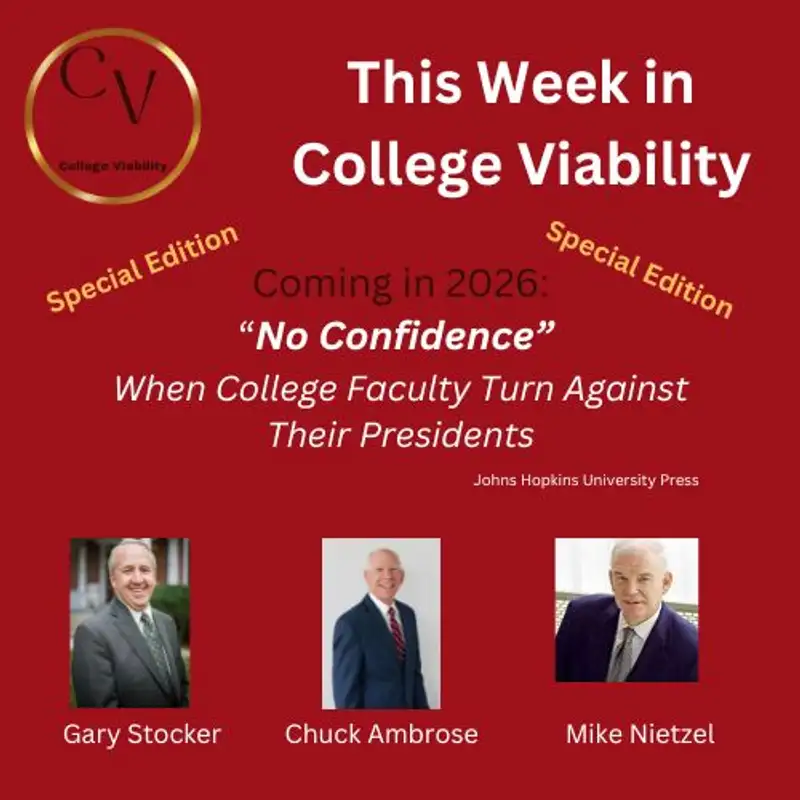
This Week In College Viability (TWICV) Special Episode: No Confidence - When College Faculty Turn Against Their Presidents',
It is universally acknowledged that higher education is faced with a multitude of challenges. The working relationships between college faculty and their president is certainly high on the list of those challenges.
The two authors of 'No Confidence - When College Faculty Turn Against Their Presidents', Chuck Ambrose and Mike Nietzel were gracious enough to join me for a special edition of 'This Week in College Viability'. While the book won't be released for many months, the points made are worthy of consideration today.
Here are the question Mike and Chuck addressed during the podcast interview.
The two authors of 'No Confidence - When College Faculty Turn Against Their Presidents', Chuck Ambrose and Mike Nietzel were gracious enough to join me for a special edition of 'This Week in College Viability'. While the book won't be released for many months, the points made are worthy of consideration today.
Here are the question Mike and Chuck addressed during the podcast interview.
- What are the factors you believe make this a timely book?
- From the book: "In the past two decades, but especially in the post-pandemic era, one of the most common reasons behind no-confidence votes has been faculty objections to presidents’ management of their institution’s finances, particularly when those decisions have involved eliminating academic programs, streamlining the institution’s organization, and reducing the number of faculty and staff." Question: How many of these no-confidence votes are the result of cultural intransigence on the part of faculty and how many are based on real financial concerns?
- From the host: The data on financial struggles is clear. There are resources out there that will let stakeholders, including faculty, see how their college compares to other colleges. College faculty are data-trained folks. Why do you think there is a focus on data in their respective academic disciplines and borderline ignorance or maybe indifference of financial data?
- From the book: "One of the more cynical allegations was that presidents had exaggerated the seriousness of the budget problems, using them as a pretext to get rid of faculty troublemakers or disfavored programs. Faculty also charged that administrators were often relying on faulty data and trampling on shared governance norms in the process." Are faculty generally informed about the difference between a budget - which is basically a hoped-for prediction - and an audited financial statement - which is a rule-based documentation of actual financial performance?
- From the book: " “You know anytime in higher education that a president advocates for major changes at an institution, it’s going to lead to a faculty outcry. It’s why no-confidence votes are becoming more common. The need for change is running head on into an entitlement mentality that change is unnecessary." WVU President Gordon Gee. Is Dr. Gee right or wrong?
- From the book: Governing boards are far too willing to defer to presidential assurances that the financial house is in good order; or that if it’s not, enrollment will pick up, an upcoming fund-raising campaign will bring financial security, or the state will answer the call for increased appropriations. The alternative scenarios -- where enrollments keep dropping, revenue continues plunging, expenses are mounting, the state is still cutting appropriations, and where once loyal donors are finding other good causes to support with their gifts -- are not taken seriously until it’s too late." How can governing boards be more proactive in assessing the true financial health of their institutions, rather than relying solely on presidential assurances?
The book will be published by Johns Hopkins University Press.
